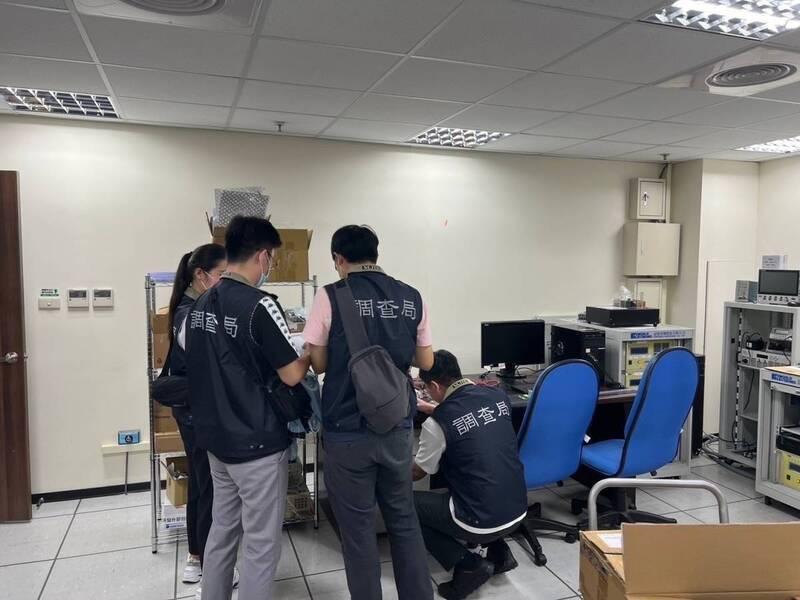Eight Chinese enterprises are suspected of poaching talent and stealing industry secrets from Taiwanese semiconductor companies by disguising their identities with shell companies overseas or setting up branches in Taiwan, the Ministry of Justice Investigation Bureau said today.
Thirty locations were raided and 65 people questioned from Aug. 19 to 30 in the joint investigation launched by the Hsinchu, Taipei, New Taipei City and Shilin prosecutors’ offices, mobilizing 135 officers under the direction of the bureau.
According to investigators, the eight Chinese enterprises hid their backgrounds and poached talent from Hsinchu Science Park, attempting to acquire high-end technologies such as semiconductors and integrated circuits.

Photo courtesy of the Hsinchu District Prosecutors’ Office
The eight Chinese enterprises involved were ICOMMSEMI (中國深圳市南方硅谷半導體), Shanghai New Vision Microelectronics Co Ltd (上海新相微電子), NJAVC (南京齊芯半導體), Emotibot Technologies Ltd (中國竹間智能科技(上海)), Tongfang Co Ltd (同方), ACTT (成都銳成芯微科技), Naura (中國北方華創微電子裝備) and HestiaPower (中國上海瀚薪科技), the bureau said in a news release.
Naura headhunted engineers by setting up a Taiwan branch office, whose major clients are high-end semiconductor manufacturers including Semiconductor Manufacturing International Corp (中芯國際集團) and Yangtze Memory Technologies Co Ltd (長江存儲科技), the bureau said.
HestiaPower introduced its capital in Taiwan by setting up shell companies overseas with funding from the Sub-Fund of China Integrated Circuit Industry Investment Fund and the Small and Medium Enterprise Development Fund of the Chinese Ministry of Finance, the bureau said.
HestiaPower aims to develop silicon carbide as a third-generation semiconductor material for application in various high-tech industries, having a huge impact on the competitiveness of the industry, the Hsinchu District Prosecutors’ Office said.
Tongfang — owned by China National Nuclear Corp, a Chinese state enterprise that oversees military nuclear programs, information technology, and energy and environment projects — disguised its source of funding by setting up a Taiwanese company that poached a research team of nearly 100 people, attempting to acquire relevant technologies, the bureau said.
ACTT, which is a supplier of integrated circuit patents and product design, attempted to cover up its illegal business in Taiwan by telling its staff to register their health insurance at trade unions or district offices, the bureau said.
Bureau Director-General Chen Pai-li (陳白立) when he took office vowed to safeguard national security and combat the Chinese Communist Party’s stealing of state-of-the-art semiconductor technologies and talent, the statement said.
The illegal acts of the Chinese enterprises have severe impacts on the competitiveness of Taiwan’s high-tech industry, the bureau said.

US climber Alex Honnold is to attempt to scale Taipei 101 without a rope and harness in a live Netflix special on Jan. 24, the streaming platform announced on Wednesday. Accounting for the time difference, the two-hour broadcast of Honnold’s climb, called Skyscraper Live, is to air on Jan. 23 in the US, Netflix said in a statement. Honnold, 40, was the first person ever to free solo climb the 900m El Capitan rock formation in Yosemite National Park — a feat that was recorded and later made into the 2018 documentary film Free Solo. Netflix previewed Skyscraper Live in October, after videos

Starting on Jan. 1, YouBike riders must have insurance to use the service, and a six-month trial of NT$5 coupons under certain conditions would be implemented to balance bike shortages, a joint statement from transportation departments across Taipei, New Taipei City and Taoyuan announced yesterday. The rental bike system operator said that coupons would be offered to riders to rent bikes from full stations, for riders who take out an electric-assisted bike from a full station, and for riders who return a bike to an empty station. All riders with YouBike accounts are automatically eligible for the program, and each membership account

NUMBERS IMBALANCE: More than 4 million Taiwanese have visited China this year, while only about half a million Chinese have visited here Beijing has yet to respond to Taiwan’s requests for negotiation over matters related to the recovery of cross-strait tourism, the Tourism Administration said yesterday. Taiwan’s tourism authority issued the statement after Chinese-language daily the China Times reported yesterday that the government’s policy of banning group tours to China does not stop Taiwanese from visiting the country. As of October, more than 4.2 million had traveled to China this year, exceeding last year. Beijing estimated the number of Taiwanese tourists in China could reach 4.5 million this year. By contrast, only 500,000 Chinese tourists are expected in Taiwan, the report said. The report

Temperatures are forecast to drop steadily as a continental cold air mass moves across Taiwan, with some areas also likely to see heavy rainfall, the Central Weather Administration (CWA) said. From today through early tomorrow, a cold air mass would keep temperatures low across central and northern Taiwan, and the eastern half of Taiwan proper, with isolated brief showers forecast along Keelung’s north coast, Taipei and New Taipei City’s mountainous areas and eastern Taiwan, it said. Lows of 11°C to 15°C are forecast in central and northern Taiwan, Yilan County, and the outlying Kinmen and Lienchiang (Matsu) counties, and 14°C to 17°C